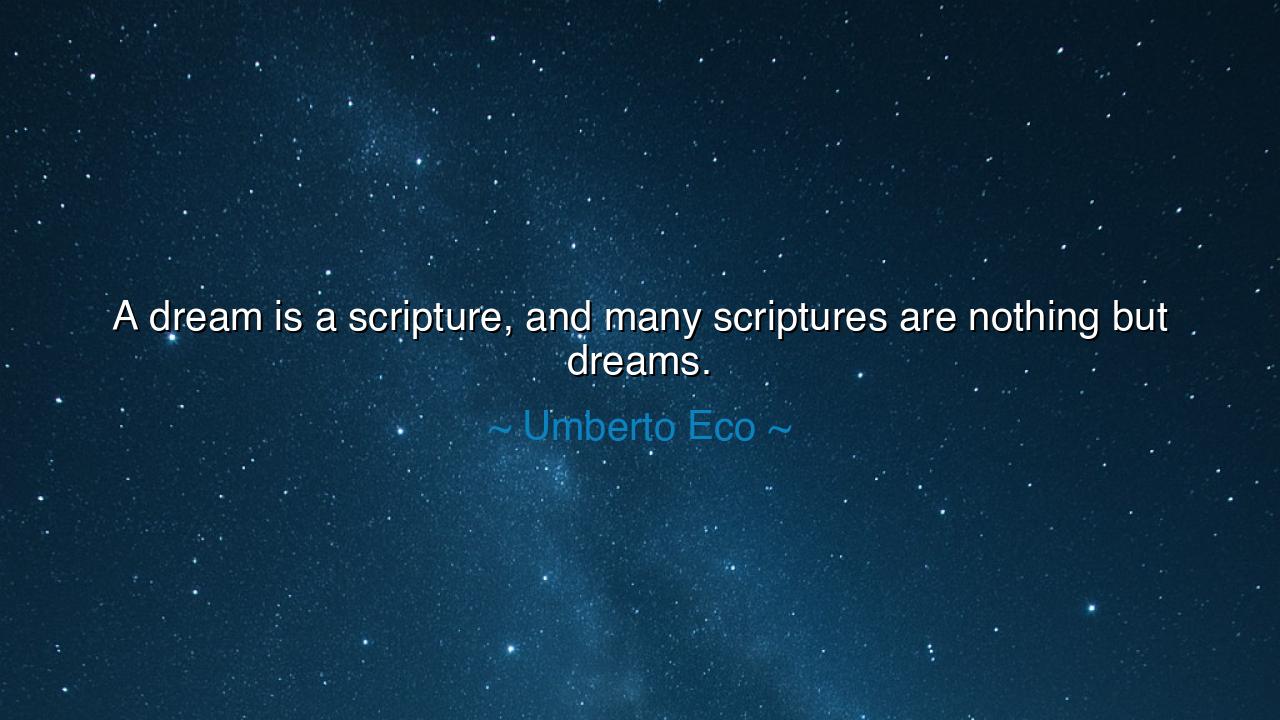
A dream is a scripture, and many scriptures are nothing but






In the profound words of Umberto Eco, "A dream is a scripture, and many scriptures are nothing but dreams," we are presented with a powerful reflection on the nature of human thought, imagination, and belief. Eco's quote invites us to reconsider the way we view both dreams and scriptures—two concepts often seen as separate and distinct. A dream, in its most basic form, is a fleeting vision, a product of the subconscious, while a scripture is traditionally a text that holds sacred or universal truths. Yet Eco challenges us to see them as one, suggesting that both are expressions of the human spirit, and that dreams, in their own way, can be just as sacred, meaningful, and worthy of reverence as any written scripture.
In the ancient world, the oracle was a powerful figure—one who spoke with the voice of the gods, offering prophecies that were revered as divine truth. Yet, these prophecies often came in the form of visions or dreams, interpreted by those who could decipher their meanings. The Greek oracles were not simply telling stories; they were believed to be delivering messages from the gods themselves. In this sense, Eco’s comparison of dreams to scripture is not without precedent. The idea that both are forms of divine communication suggests that the realm of the unconscious—where dreams arise—is just as potent a source of wisdom as the sacred texts passed down through generations.
One need only look at the life of Joseph, the biblical figure, who rose from humble beginnings to become a powerful leader in Egypt. Joseph’s story is built upon the dreams he had as a young man, which foretold of his future greatness. His dreams, dismissed by his brothers as mere fantasy, were ultimately proven true, making his story one of faith, vision, and the power of dreams to shape the future. Joseph’s interpretation of dreams was so revered that he became a figure of great wisdom and spiritual insight. His life is a testament to the idea that dreams, like scriptures, carry within them deep truths, even if they are not immediately understood by those who encounter them.
The philosophers of ancient Greece, such as Plato, also understood the power of dreams and their connection to a deeper reality. In his writings, Plato often spoke of the realm of forms, a place where true knowledge resides, beyond the physical world. For Plato, the dreams and visions of certain individuals were glimpses into this higher reality, and could, in a sense, be considered a form of scripture—not in written form, but as direct encounters with truth. Thus, Plato’s idea suggests that the truths conveyed through dreams are no less significant than those conveyed through sacred texts or philosophical reasoning.
Eco’s words also invite us to reflect on the relationship between imagination and reality. Dreams are often dismissed as mere fantasy, but they hold immense power in shaping the way we understand our world and our place in it. Just as the scriptures of old have shaped civilizations, so too do our dreams shape our minds and influence our actions. The imagination that dreams spark can lead to great discoveries, artistic achievements, and even profound spiritual revelations. It is through the lens of imagination that we can transcend the boundaries of our current understanding and glimpse what might be possible, much as the prophets and sages of the past did when they wrote the scriptures that would guide generations to come.
Take, for example, the life of Leonardo da Vinci, whose inventions and works of art were often born from the realm of dreams and imagination. Da Vinci’s notebooks are filled with sketches and ideas for inventions that were, for his time, impossible. Yet his vision, his dream of what the world could be, laid the groundwork for many of the technologies we use today. Leonardo’s ability to dream and see beyond the limits of his time speaks to Eco’s notion that dreams, like scriptures, can be sources of wisdom and guidance. His dreams were not mere fantasies; they were glimpses of what might one day be realized, much like the visions of ancient prophets that foretold a better future.
The lesson in Eco’s words is a reminder that we should not dismiss our dreams as insignificant, nor should we view scriptures as the only avenue for receiving wisdom. Our dreams, whether literal or figurative, contain within them the seeds of creativity, insight, and truth. Just as the ancients sought wisdom in sacred texts, we must seek wisdom in our inner voices, in the quiet whispers of our subconscious that reveal the world’s hidden mysteries. Like Joseph and Leonardo, we must learn to trust the dreams we hold, for they may guide us to greater truths than we could ever imagine.
As we move forward in our own lives, let us remember that both dreams and scriptures are sacred. Let us listen to our inner voices, trust our intuition, and honor the dreams that come to us in quiet moments, for they may hold the keys to our future, just as the scriptures of old have shaped the past. In doing so, we honor the deep wisdom that connects us all to the greater mysteries of the world. Like the ancient sages, we must remain open to the possibility that the truths we seek are not always written in books, but are often found in the quiet depths of our own dreams.






AAdministratorAdministrator
Welcome, honored guests. Please leave a comment, we will respond soon